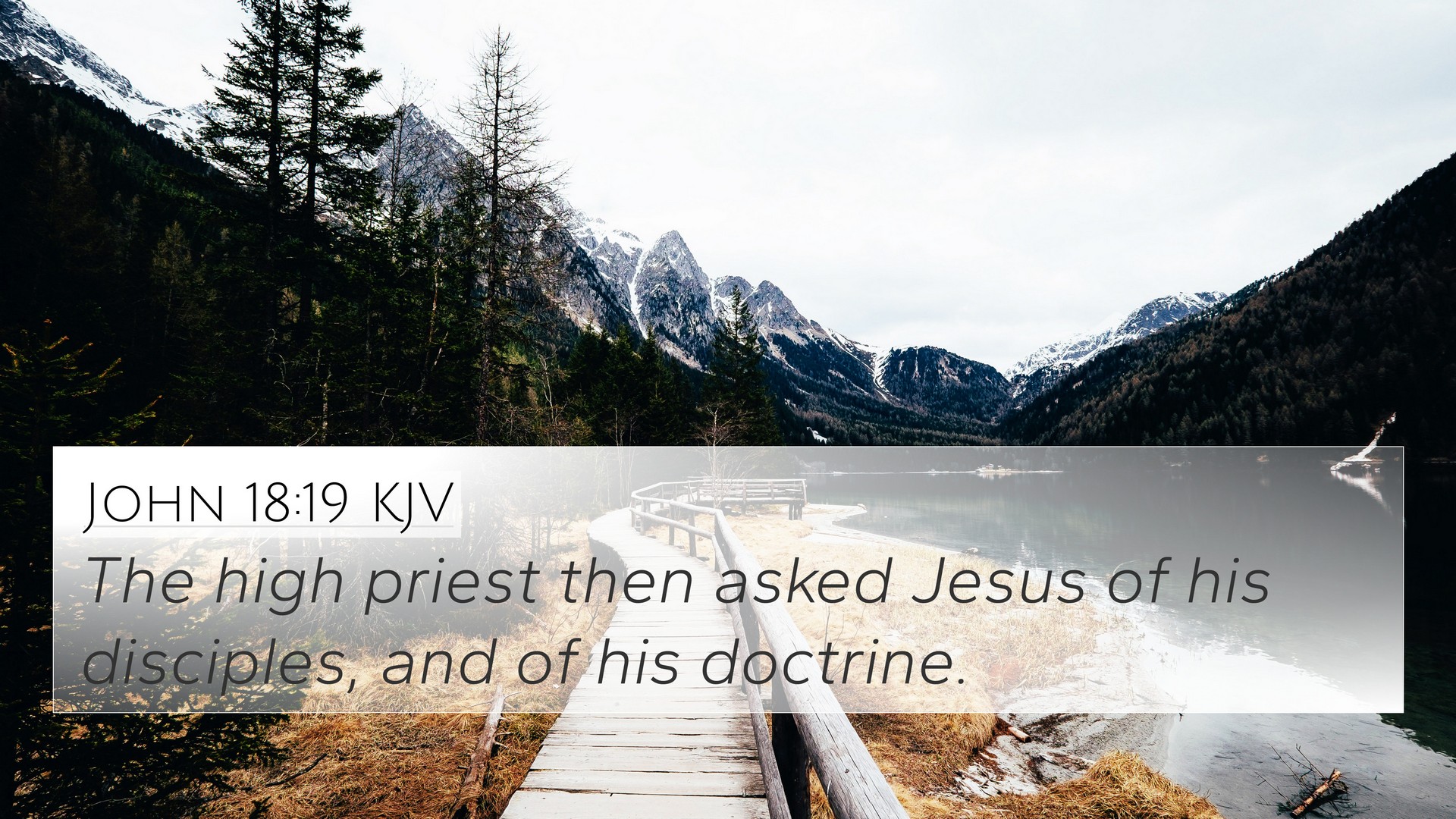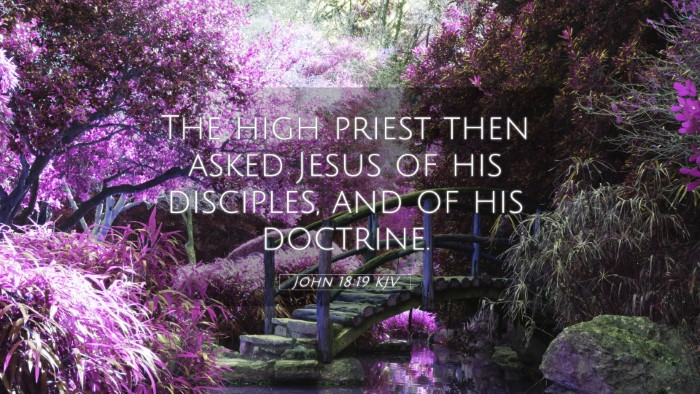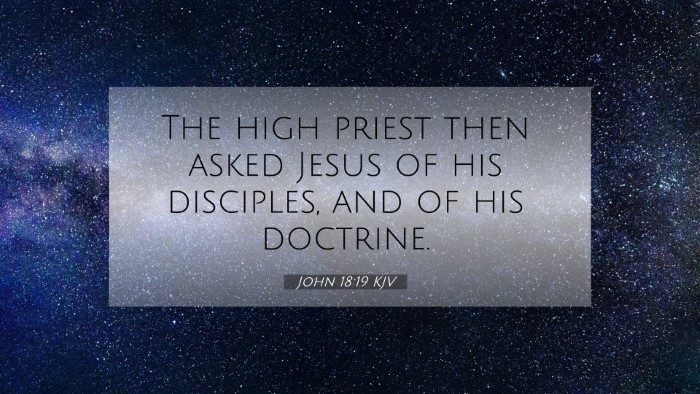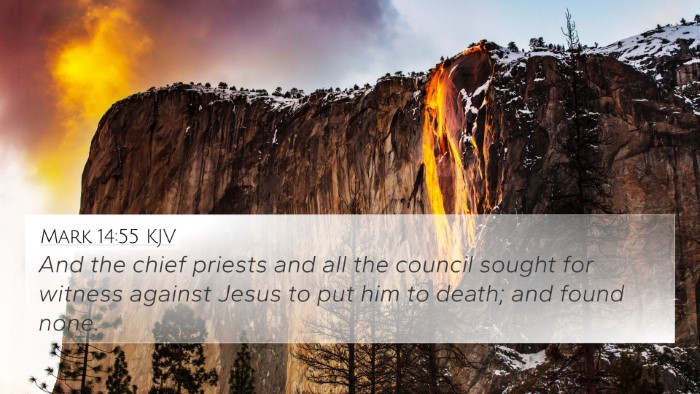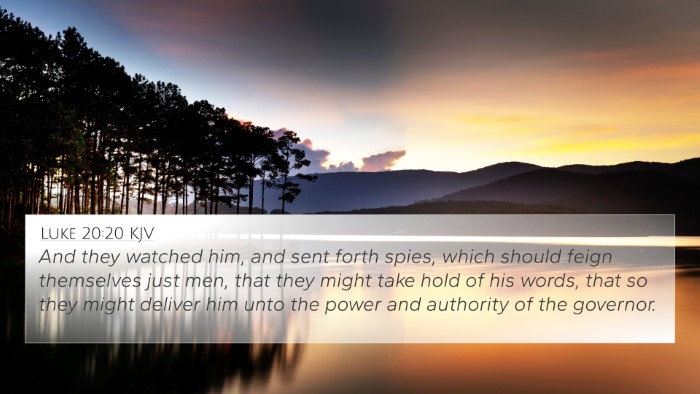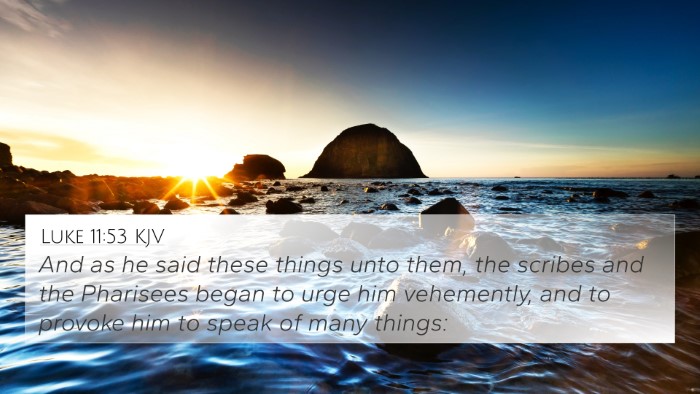Understanding John 18:19
In John 18:19, we witness a crucial moment during the trial of Jesus Christ, where He is questioned about His disciples and His teachings. This verse serves not only as a pivotal point in the Passion narrative but also illuminates the themes of authority, truth, and the nature of Jesus' mission. Below is a detailed analysis that incorporates insights from public domain commentaries to deepen our understanding of this passage.
Verse Text
John 18:19 (KJV): "The high priest then asked Jesus of his disciples, and of his doctrine."
Commentary Insights
Matthew Henry's Commentary
Matthew Henry notes that the high priest’s inquiry into Jesus' disciples and doctrine was both an attempt to gather evidence against Him and to undermine His following. By focusing on His disciples, the priests sought to show that Jesus had instigated dissent among the people. Additionally, Henry emphasizes that Jesus’ commitment to teaching the truth, contrasted with the deceitful motives of His accusers, highlights His unwavering purpose to reveal God’s message.
Albert Barnes' Notes
Albert Barnes elaborates that the high priest's questioning reflects a desire to challenge Jesus' authority. He interprets the emphasis on “doctrine” as the essence of Jesus’ ministry. Barnes underscores that Jesus had openly taught and did not operate in secrecy; His doctrine was meant for everyone, marking a significant contrast with the hidden agendas of religious leaders.
Adam Clarke's Commentary
Adam Clarke adds that this interrogation reveals the high priest's ignorance and fear regarding Jesus’ influence. Clarke indicates that the use of the term "disciples" indicates a collective identity which was seen as a threat by the religious authorities. Furthermore, the inquiry reflects a misunderstanding of Jesus’ mission, which was global, not merely restricted to a few followers.
Thematic Connections
John 18:19 opens up multiple thematic avenues as we consider the verses that relate to this inquiry. Below are some prominent Bible verse cross-references that elucidate these themes:
- Matthew 26:59-60: The religious leaders sought false testimony against Jesus.
- Luke 22:66-71: Details the trial before the council, stressing the focus on Jesus' identity.
- John 2:24-25: Jesus did not entrust Himself to people, knowing what was in their hearts.
- Acts 4:18: The apostles were commanded not to speak in Jesus' name, showing the continued fear of His followers.
- John 7:15: The Jewish leaders marveled at Jesus' knowledge, questioning His qualifications to teach.
- John 13:1-2: Earlier in the narrative, Jesus was aware that His time had come, with awareness of the plots against Him.
- Mark 14:55-56: A portrayal of how witnesses were sought against Jesus, emphasizing the conspiracy.
- 1 Peter 2:23: Jesus, when He was reviled, did not retaliate, showcasing His composed demeanor amidst accusations.
- John 12:42-43: Many believed in Him but did not confess Him to avoid the repercussions, highlighting the societal pressure.
- James 1:5: Discusses seeking wisdom, echoing the contrast between divine insight and the ignorance of earthly authorities.
Reflections on Inter-Biblical Dialogue
The interactions in John 18:19 also invite a deeper inter-Biblical dialogue, particularly between the Old and New Testaments. The theme of questioning authority and the nature of truth can be traced through various scriptural narratives:
- Exodus 20:16: “You shall not bear false witness against your neighbor,” illustrating the moral implications of the high priest's inquiry.
- Isaiah 53:7: Prophecy concerning the suffering servant, highlighting His silence before accusers.
- Psalms 26:1-2: A plea for divine judgment based on righteous living, resonating with Jesus’ integrity.
- Proverbs 14:5: A faithful witness does not lie, contrasting Jesus’ truthful testimony against the high priest's motives.
Conclusion
John 18:19 encapsulates the tension between Jesus and the religious authorities, serving as a focal point in the narrative of His passion. The verse not only demonstrates the adversarial relationship between Him and the leaders but also emphasizes His commitment to truth. Through the lens of historical and theological analysis, reinforced by the tools for Bible cross-referencing, we can see how interconnected the Scriptures are, as they continually echo themes of truth, authority, and the nature of discipleship.
Final Thoughts on Bible Verse Analysis
Engaging with John 18:19 through various commentaries and historical analysis helps to uncover the richness of its meaning. By employing comprehensive Bible cross-reference materials, readers can explore more profound connections and gain a holistic understanding of biblical teachings. As we reflect on the inquiry posed by the high priest, we are reminded of the enduring challenge to discern the truth amid opposition.
